Piano Sheet Music
 "The Strat covers the complete spectrum of human emotion. The tremolo enables you to do anything - you can hit any note known to mankind" Jeff Beck
"The Strat covers the complete spectrum of human emotion. The tremolo enables you to do anything - you can hit any note known to mankind" Jeff Beck
Pirates of the Caribbean: Dead Mans Chest
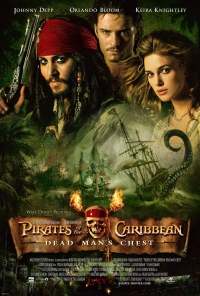
Pirates of the Caribbean: Dead Man's Chest is a 2006 adventure film of the Pirates of the Caribbean series, the sequel to the 2003 film Pirates of the Caribbean: The Curse of the Black Pearl and the first film from Walt Disney Pictures to feature the current logo. The film was directed by Gore Verbinski, written by Ted Elliott and Terry Rossio, and produced by Jerry Bruckheimer. The movie received 4 Academy Award nominations for Best Art Direction, Sound Editing, Sound Mixing, and won the Academy Award for Visual Effects.
The story picks up from where the first film left off when Captain Jack Sparrow (Johnny Depp) discovers his debt to the villainous Davy Jones (Bill Nighy) is due, while Will Turner (Orlando Bloom) and Elizabeth Swann (Keira Knightley) are arrested by Lord Cutler Beckett (Tom Hollander) for helping Jack Sparrow escape execution.
The film was shot back-to-back with the third film during 2005, and was released in Australia and the United Kingdom on July 6, 2006, and in the United States and Canada on July 7, 2006. The film received mixed reviews, with praise for its special effects and criticism for its confusing plot and lengthy running time. Despite this, Pirates of the Caribbean: Dead Man's Chest set several records in its first three days, with an opening weekend of $136 million in the United States, and became the third movie to gross over $1 billion in the worldwide box office, behind Titanic and The Lord of the Rings: The Return of the King.
The story picks up from where the first film left off when Captain Jack Sparrow (Johnny Depp) discovers his debt to the villainous Davy Jones (Bill Nighy) is due, while Will Turner (Orlando Bloom) and Elizabeth Swann (Keira Knightley) are arrested by Lord Cutler Beckett (Tom Hollander) for helping Jack Sparrow escape execution.
The film was shot back-to-back with the third film during 2005, and was released in Australia and the United Kingdom on July 6, 2006, and in the United States and Canada on July 7, 2006. The film received mixed reviews, with praise for its special effects and criticism for its confusing plot and lengthy running time. Despite this, Pirates of the Caribbean: Dead Man's Chest set several records in its first three days, with an opening weekend of $136 million in the United States, and became the third movie to gross over $1 billion in the worldwide box office, behind Titanic and The Lord of the Rings: The Return of the King.
The Simpsons
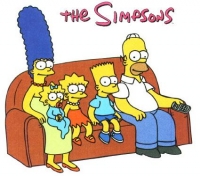
The Simpsons is an American animated sitcom which was created by Matt Groening for the Fox Broadcasting Company. It is a satirical parody of the middle class American lifestyle epitomized by its titular family, which consists of Homer, Marge, Bart, Lisa, and Maggie. The show is set in the fictional town of Springfield, and it lampoons many aspects of the human condition, as well as American culture, society as a whole, and television itself.
The family was conceived by Groening shortly before a pitch for a series of animated shorts with the producer James L. Brooks. Groening created a dysfunctional family and named the characters after members of his own family, substituting Bart for his own name. The shorts became a part of The Tracey Ullman Show on April 19, 1987. After a three-season run, the sketch was developed into a half-hour prime time show and was an early hit for Fox, becoming the first Fox series to land in the Top 30 ratings in a season (1992-1993).
Since its debut on December 17, 1989, the show has broadcast 420 episodes and the twentieth season will commence airing in on September 28, 2008. The Simpsons Movie, a feature-length film, was released in theaters worldwide on July 26 and July 27, 2007, and has grossed approximately US$526.2 million worldwide to date.
The Simpsons has won dozens of awards since it debuted as a series, including 24 Emmy Awards, 26 Annie Awards and a Peabody Award. Time magazine's December 31, 1999 issue named it the 20th century's best television series, and on January 14, 2000 it was awarded a star on the Hollywood Walk of Fame. The Simpsons is the longest-running American sitcom and the longest-running American animated program. Homer's annoyed grunt "D'oh!" has been adopted into the English lexicon, while The Simpsons has influenced many adult-oriented animated sitcoms.
The series' distinctive theme song was composed by musician Danny Elfman in 1989, after Groening approached him requesting a retro style piece. This piece, which took two days to create, has been noted by Elfman as the most popular of his career.
The family was conceived by Groening shortly before a pitch for a series of animated shorts with the producer James L. Brooks. Groening created a dysfunctional family and named the characters after members of his own family, substituting Bart for his own name. The shorts became a part of The Tracey Ullman Show on April 19, 1987. After a three-season run, the sketch was developed into a half-hour prime time show and was an early hit for Fox, becoming the first Fox series to land in the Top 30 ratings in a season (1992-1993).
Since its debut on December 17, 1989, the show has broadcast 420 episodes and the twentieth season will commence airing in on September 28, 2008. The Simpsons Movie, a feature-length film, was released in theaters worldwide on July 26 and July 27, 2007, and has grossed approximately US$526.2 million worldwide to date.
The Simpsons has won dozens of awards since it debuted as a series, including 24 Emmy Awards, 26 Annie Awards and a Peabody Award. Time magazine's December 31, 1999 issue named it the 20th century's best television series, and on January 14, 2000 it was awarded a star on the Hollywood Walk of Fame. The Simpsons is the longest-running American sitcom and the longest-running American animated program. Homer's annoyed grunt "D'oh!" has been adopted into the English lexicon, while The Simpsons has influenced many adult-oriented animated sitcoms.
The series' distinctive theme song was composed by musician Danny Elfman in 1989, after Groening approached him requesting a retro style piece. This piece, which took two days to create, has been noted by Elfman as the most popular of his career.
Brokeback Mountain

Brokeback Mountain is a 2005 romantic-drama film that depicts the complex romantic and sexual relationship between two men in the American West from 1963 to 1983.
The film was directed by Taiwanese director Ang Lee from a screenplay by Diana Ossana and Larry McMurtry, which they adapted from the short story "Brokeback Mountain" by Annie Proulx. The film stars Heath Ledger, Jake Gyllenhaal, Anne Hathaway, and Michelle Williams.
Brokeback Mountain won the Golden Lion at the Venice Film Festival, and was honored with Best Picture and Best Director accolades from the British Academy of Film and Television Arts, Golden Globe Awards, Critics Choice Awards, and Independent Spirit Awards among many other organizations and festivals. Brokeback Mountain had the most nominations (eight) for the 78th Academy Awards, where it won three: Best Director, Best Adapted Screenplay, and Best Original Score. The film was widely considered to be a front runner for the Academy Award for Best Picture, but lost to Crash.
The film was directed by Taiwanese director Ang Lee from a screenplay by Diana Ossana and Larry McMurtry, which they adapted from the short story "Brokeback Mountain" by Annie Proulx. The film stars Heath Ledger, Jake Gyllenhaal, Anne Hathaway, and Michelle Williams.
Brokeback Mountain won the Golden Lion at the Venice Film Festival, and was honored with Best Picture and Best Director accolades from the British Academy of Film and Television Arts, Golden Globe Awards, Critics Choice Awards, and Independent Spirit Awards among many other organizations and festivals. Brokeback Mountain had the most nominations (eight) for the 78th Academy Awards, where it won three: Best Director, Best Adapted Screenplay, and Best Original Score. The film was widely considered to be a front runner for the Academy Award for Best Picture, but lost to Crash.
A Beautiful Mind
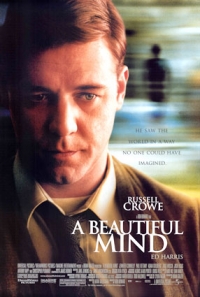
A Beautiful Mind is a 2001 American biographical film about John Forbes Nash, the Nobel Laureate in Economics. The film was directed by Ron Howard and written by Akiva Goldsman. It was inspired by a bestselling, Pulitzer Prize-nominated 1998 book of the same name by Sylvia Nasar. The film stars Russell Crowe, along with Jennifer Connelly, Ed Harris and Paul Bettany.
The story begins in the early years of Nash's life at Princeton University as he develops his "original idea" that will revolutionize the world of mathematics. Early in the movie, Nash begins developing paranoid schizophrenia and endures delusional episodes while painfully watching the loss and burden his condition brings on his wife and friends.
The film opened in US cinemas on December 21, 2001. It was well-received by critics, grossed over $300 million worldwide, and went on to win four Academy Awards, including Best Picture, Best Director, Best Adapted Screenplay, and Best Supporting Actress. It was also nominated for Best Leading Actor, Best Editing, Best Makeup, and Best Score. The film has been criticized for its inaccurate portrayal of some aspects of Nash's life.
The story begins in the early years of Nash's life at Princeton University as he develops his "original idea" that will revolutionize the world of mathematics. Early in the movie, Nash begins developing paranoid schizophrenia and endures delusional episodes while painfully watching the loss and burden his condition brings on his wife and friends.
The film opened in US cinemas on December 21, 2001. It was well-received by critics, grossed over $300 million worldwide, and went on to win four Academy Awards, including Best Picture, Best Director, Best Adapted Screenplay, and Best Supporting Actress. It was also nominated for Best Leading Actor, Best Editing, Best Makeup, and Best Score. The film has been criticized for its inaccurate portrayal of some aspects of Nash's life.
Tarzan
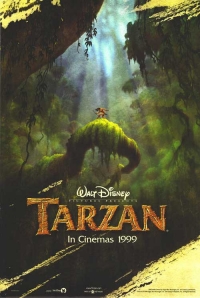
Tarzan is a 1999 animated feature film produced by Walt Disney Feature Animation and released by Walt Disney Pictures on June 18, 1999. The thirty-seventh film in the Disney animated features canon, it is based on the story Tarzan of the Apes by Edgar Rice Burroughs, and is the only major motion picture version of the story Tarzan property to be animated. It was also the last "bona fide" hit before the Disney slump of the early 2000s making $171,091,819 in domestic gross and $448,191,819 worldwide, outgrossing its predecessors Mulan and Hercules. To date, it is the last film based on the fictional character Tarzan to have had a theatrical release, and also currently holds the record for being the most expensive Disney animated film, with a budget of $150 million. It was also the first Disney animated feature to open at #1 since Pocahontas. It is the last movie that belongs to the Disney Renaissance.
Tarzan: An Original Walt Disney Records Soundtrack is the soundtrack for the 1999 Disney animated film, Tarzan. The songs on the soundtrack were by Phil Collins, and the instrumental score by Mark Mancina. The song "You'll Be in My Heart," won both an Oscar and a Golden Globe for best original song.
Tarzan was the first Disney soundtrack to be recorded in multiple languages for different markets, some by original singer Collins. Phil Collins was helped by composer Eric Serra to record and produce French version of the songs.
Tarzan: An Original Walt Disney Records Soundtrack is the soundtrack for the 1999 Disney animated film, Tarzan. The songs on the soundtrack were by Phil Collins, and the instrumental score by Mark Mancina. The song "You'll Be in My Heart," won both an Oscar and a Golden Globe for best original song.
Tarzan was the first Disney soundtrack to be recorded in multiple languages for different markets, some by original singer Collins. Phil Collins was helped by composer Eric Serra to record and produce French version of the songs.
Friends
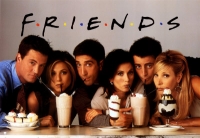
Friends is a sitcom about a group of friends in the Greenwich Village area of Manhattan, New York City. It was originally broadcast from 1994 to 2004. It was created by David Crane and Marta Kauffman, and produced by Kevin S. Bright, Marta Kauffman and David Crane. The show has been broadcast in more than one hundred countries and still continues to attract good ratings for its episodes in syndication. The final episode of the show was watched by an estimated US audience of 51.1 million. From the 10 years run, the show had won 6 Emmys, including one for Outstanding Comedy Series. It also received a Golden Globe, 2 SAG Awards, and 56 other various awards with 152 nominations.
Home Alone
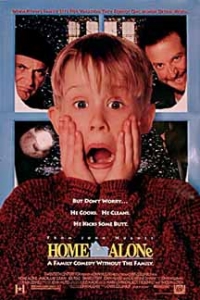
Home Alone is a popular movie series. The term usually refers to the first film in the series, which by the end of its run was the third highest grossing film of all time, making a major star of lead actor Macaulay Culkin.
Charlie Brown
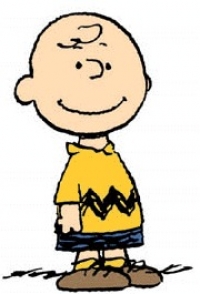
Charles "Charlie" Brown is the main character in the comic strip Peanuts by Charles M. Schulz.
The Wedding Singer (Musical)
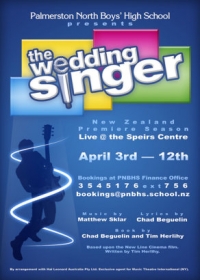
The Wedding Singer is a musical based on the film The Wedding Singer, with music by Matthew Sklar, lyrics by Chad Beguelin, and a book by Chad Beguelin and Tim Herlihy.
The musical opened on Broadway at the Al Hirschfeld Theatre on April 27, 2006 and closed on December 31, 2006 after 284 performances. It was directed by John Rando, with choreography by Rob Ashford, and featured Stephen Lynch as Robbie.
A U.S. tour began on August 31, 2007. A Swedish version opened in Karlstad on September 1, 2007. El Rey de Bodas, the Spanish-language version, which translates into "The King of Weddings", opened in Madrid in October 2007.
A UK tour opened at the Manchester Palace Theatre in February 2008 starring Jonathan Wilkes and Natalie Casey, and after touring the UK is then expected to begin an open-ended West End run towards the end of 2008 and early 2009. The Japanese version will open in Tokyo at the Nissay Theatre on February 6, 2008, and other foreign productions are scheduled for Finland, Germany, Australia, and South Korea. The show's New Zealand premiere season started on April 3rd and ran until April 13, 2008 at Palmerston North Boys' High School's Speirs Centre with a cast of amateur actors from Palmerston North Boys' and Palmerston North Girls' High Schools. The season was directed by Chris Burton and Liz O'Connor. South Australian premiere will open on July 9th 2008 at the Arts Theatre, Adelaide, presented by Matt Byrne Media.
Amateur rights have been released in Australia prior to any professional production.
In Finland, an open air version of the musical will be performed in the city of Turku from June to August 2008.
The musical opened on Broadway at the Al Hirschfeld Theatre on April 27, 2006 and closed on December 31, 2006 after 284 performances. It was directed by John Rando, with choreography by Rob Ashford, and featured Stephen Lynch as Robbie.
A U.S. tour began on August 31, 2007. A Swedish version opened in Karlstad on September 1, 2007. El Rey de Bodas, the Spanish-language version, which translates into "The King of Weddings", opened in Madrid in October 2007.
A UK tour opened at the Manchester Palace Theatre in February 2008 starring Jonathan Wilkes and Natalie Casey, and after touring the UK is then expected to begin an open-ended West End run towards the end of 2008 and early 2009. The Japanese version will open in Tokyo at the Nissay Theatre on February 6, 2008, and other foreign productions are scheduled for Finland, Germany, Australia, and South Korea. The show's New Zealand premiere season started on April 3rd and ran until April 13, 2008 at Palmerston North Boys' High School's Speirs Centre with a cast of amateur actors from Palmerston North Boys' and Palmerston North Girls' High Schools. The season was directed by Chris Burton and Liz O'Connor. South Australian premiere will open on July 9th 2008 at the Arts Theatre, Adelaide, presented by Matt Byrne Media.
Amateur rights have been released in Australia prior to any professional production.
In Finland, an open air version of the musical will be performed in the city of Turku from June to August 2008.
Pinocchio
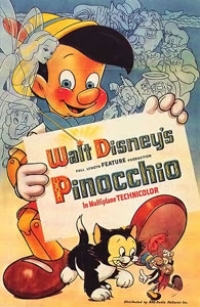
Pinocchio is the second animated feature in the Walt Disney Animated Classics. It was produced by Walt Disney and was originally released to theatres by RKO Radio Pictures on February 7, 1940. Based on the story Pinocchio: Tale of a Puppet by Carlo Collodi, it was made in response to the enormous success of Snow White and the Seven Dwarfs. The plot of the film involves a wooden puppet being brought to life by a blue fairy, who tells him he can become a real boy if he proves himself "brave, truthful, and unselfish". Thus begin the puppet's adventures to become a real boy, which involve many encounters with a host of unsavory characters.
The film was adapted by Aurelius Battaglia, William Cottrell, Otto Englander, Erdman Penner, Joseph Sabo, Ted Sears, and Webb Smith from Collodi's book. The production was supervised by Ben Sharpsteen and Hamilton Luske, and the film's sequences were directed by Norman Ferguson, T. Hee, Wilfred Jackson, Jack Kinney, and Bill Roberts.
Pinocchio is the soundtrack to the 1940 Walt Disney film of the same name, first released on February 9, 1940. The album was described as being "recorded from the original soundtrack of the Walt Disney Production Pinocchio". According to Walt Disney Records, "this is the first time the phrase 'original soundtrack' was used to refer to a commercially available movie recording".
The film was adapted by Aurelius Battaglia, William Cottrell, Otto Englander, Erdman Penner, Joseph Sabo, Ted Sears, and Webb Smith from Collodi's book. The production was supervised by Ben Sharpsteen and Hamilton Luske, and the film's sequences were directed by Norman Ferguson, T. Hee, Wilfred Jackson, Jack Kinney, and Bill Roberts.
Pinocchio is the soundtrack to the 1940 Walt Disney film of the same name, first released on February 9, 1940. The album was described as being "recorded from the original soundtrack of the Walt Disney Production Pinocchio". According to Walt Disney Records, "this is the first time the phrase 'original soundtrack' was used to refer to a commercially available movie recording".
Evita
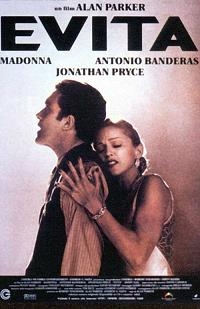
Evita is the film adaptation of Andrew Lloyd Webber's musical based on the life of Eva Perón. It was directed by Alan Parker and starred Madonna, Antonio Banderas and Jonathan Pryce. It was released on December 25, 1996 by Hollywood and Cinergi Pictures.
Gladiator
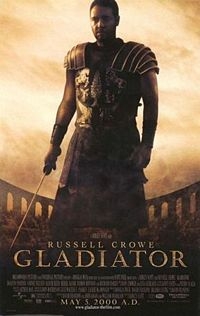
Gladiator is a 2000 epic film directed by Ridley Scott and starring Russell Crowe, Joaquin Phoenix, Connie Nielsen, Oliver Reed, Djimon Hounsou, Derek Jacobi and Richard Harris. Crowe portrays General Maximus Decimus Meridius, friend of Emperor Marcus Aurelius who is betrayed and murdered by the emperor's ambitious son, Commodus (Phoenix). Captured and enslaved along the outer fringes of the Roman empire, Maximus rises through the ranks of the gladiatorial arena to avenge the murder of his family and his Emperor.
The film won five Academy Awards in the 73rd Academy Awards ceremony, including Best Picture. The film's epic scope and intense battle scenes, as well as the emotional core of its performances, received much praise. The film's success may have helped to revive the sword and sandal subgenre of historical epics, such as the subsequent films Troy, 300, and Scott's own Kingdom of Heaven.
The film won five Academy Awards in the 73rd Academy Awards ceremony, including Best Picture. The film's epic scope and intense battle scenes, as well as the emotional core of its performances, received much praise. The film's success may have helped to revive the sword and sandal subgenre of historical epics, such as the subsequent films Troy, 300, and Scott's own Kingdom of Heaven.
Music and Lyrics
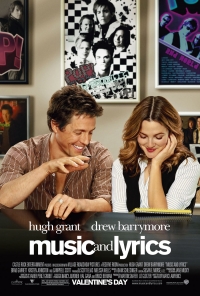
Music and Lyrics is a romantic comedy film released by Warner Bros. on February 14, 2007 in the United States, Canada, and Australia, and on February 9, 2007 in the United Kingdom. The film stars Hugh Grant as Alex Fletcher, a washed-up 1980s pop star and Drew Barrymore as Sophie Fisher, a former English literature major. It tells the story of their efforts to write a song for singer Cora Corman (Haley Bennett), and their subsequent romance.
The film received mixed reviews from contemporary critics, but topped the UK box office. At the North American box office, it debuted at number four and generated $19 million in its first week.
The film received mixed reviews from contemporary critics, but topped the UK box office. At the North American box office, it debuted at number four and generated $19 million in its first week.
Pearl Harbor

Pearl Harbor is a 2001 war film directed by Michael Bay. It features a large ensemble cast, including Ben Affleck, Alec Baldwin, Jon Voight, Josh Hartnett, Kate Beckinsale, Cuba Gooding Jr., Dan Aykroyd, Jaime King, and Jennifer Garner. It is a dramatic re-imagining of the attack on Pearl Harbor, produced by the team of Bay and Jerry Bruckheimer, who had previously worked on summer mega-blockbusters such as Armageddon and The Rock. The final section of the movie recounts the Doolittle Raid, the first American attack on the Japanese home islands in World War II. Some scenes in the movie were some of the last to be filmed in Technicolor.
Requiem for a Dream
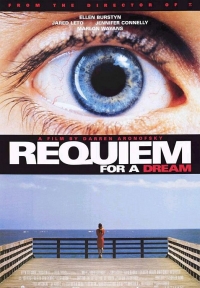
Requiem for a Dream is an Academy Award-nominated 2000 film adaptation of the 1978 novel of the same name. The novel was written by Hubert Selby, Jr.; the film adaptation was directed by Darren Aronofsky, and starred Ellen Burstyn, Jared Leto, Jennifer Connelly, Matt Taylor and Marlon Wayans. Burstyn was nominated for an Academy Award for Best Actress for her performance.
City of Angels
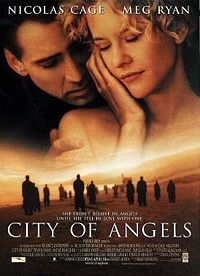
City of Angels is an English language film directed by Brad Silberling in 1998. The film stars Nicolas Cage and Meg Ryan. Set in Los Angeles, California, the film is a remake of Wim Wenders' 1987 German film Wings of Desire (Der Himmel über Berlin), which was set in Berlin.
Cinema Paradiso
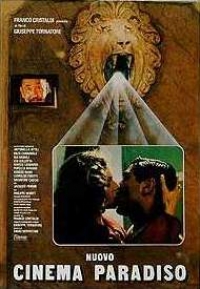
Nuovo Cinema Paradiso (1988) is an Italian film written and directed by Giuseppe Tornatore. It was internationally released as Cinema Paradiso in France, Spain, the UK and the U.S.
It was originally released in Italy at 155 minutes but poor box office performance in its native country led to it being shortened to 123 minutes for international release. It was an instant success. This international version won the Special Jury Prize at the 1989 Cannes Film Festival and the 1989 Best Foreign Language Film Oscar. In 2002, the director's cut 173-minute version was released (known in the U.S. as Cinema Paradiso: The New Version).
It stars Jacques Perrin, Philippe Noiret, Leopoldo Trieste, Marco Leonardi, Agnese Nano and Salvatore Cascio. It was produced by Franco Cristaldi and Giovanna Romagnoli, and the music was by Ennio Morricone along with his son Andrea Morricone.
Told in flashback, it tells the story of the return to his native Sicilian village of a successful film director Salvatore for the funeral of his old friend Alfredo, who was the projectionist at the local "Cinema Paradiso". Ultimately, Alfredo serves as a wise father figure to his young friend who only wishes the best to see him succeed, even if it means breaking his heart in the process.
The film intertwines sentimentality with comedy, and nostalgia with pragmaticism. It explores issues of youth, coming of age, and reflections (in adulthood) about the past. The imagery in each scene can be said to reflect Salvatore's idealised memories about his childhood. Cinema Paradiso is also a celebration of films; as a projectionist, young Salvatore (a.k.a Totò) develops the passion for films that shape his life path in adulthood.
It was originally released in Italy at 155 minutes but poor box office performance in its native country led to it being shortened to 123 minutes for international release. It was an instant success. This international version won the Special Jury Prize at the 1989 Cannes Film Festival and the 1989 Best Foreign Language Film Oscar. In 2002, the director's cut 173-minute version was released (known in the U.S. as Cinema Paradiso: The New Version).
It stars Jacques Perrin, Philippe Noiret, Leopoldo Trieste, Marco Leonardi, Agnese Nano and Salvatore Cascio. It was produced by Franco Cristaldi and Giovanna Romagnoli, and the music was by Ennio Morricone along with his son Andrea Morricone.
Told in flashback, it tells the story of the return to his native Sicilian village of a successful film director Salvatore for the funeral of his old friend Alfredo, who was the projectionist at the local "Cinema Paradiso". Ultimately, Alfredo serves as a wise father figure to his young friend who only wishes the best to see him succeed, even if it means breaking his heart in the process.
The film intertwines sentimentality with comedy, and nostalgia with pragmaticism. It explores issues of youth, coming of age, and reflections (in adulthood) about the past. The imagery in each scene can be said to reflect Salvatore's idealised memories about his childhood. Cinema Paradiso is also a celebration of films; as a projectionist, young Salvatore (a.k.a Totò) develops the passion for films that shape his life path in adulthood.
Shakespeare in Love
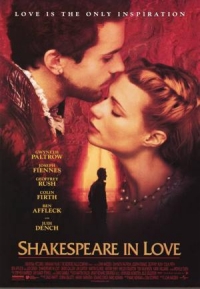
Shakespeare in Love is a 1998 romantic comedy/drama film. The film was directed by John Madden and co-written by playwright Tom Stoppard, whose first major success was with the Shakespeare-influenced play Rosencrantz & Guildenstern Are Dead.
The film is largely fictional, although several of the characters are based on real people. In addition, many of the characters, lines, and plot devices are references to Shakespeare's plays.
Shakespeare in Love won a number of Academy Awards in 1999, including Best Picture, Best Actress (for Gwyneth Paltrow) and Best Supporting Actress (for Judi Dench). It was the first comedy to win the Best Picture award since Annie Hall (1977) and no comedy has won the award since.
The film is largely fictional, although several of the characters are based on real people. In addition, many of the characters, lines, and plot devices are references to Shakespeare's plays.
Shakespeare in Love won a number of Academy Awards in 1999, including Best Picture, Best Actress (for Gwyneth Paltrow) and Best Supporting Actress (for Judi Dench). It was the first comedy to win the Best Picture award since Annie Hall (1977) and no comedy has won the award since.
King Kong
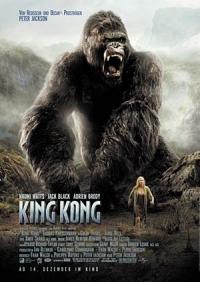
King Kong is a 2005 remake of the 1933 film of the same name about a fictional giant ape called Kong. The film was directed by Peter Jackson and stars Naomi Watts as Ann Darrow, Jack Black as Carl Denham, Adrien Brody as Jack Driscoll and, through performance capture, Andy Serkis as Kong. Serkis also played Lumpy, the galley chef on the SS Venture.
In 1933, Great Depression-era New York City, actress Ann Darrow has just lost her job at the local theatre and is recruited by film director Carl Denham because of the presence of her favourite writer Jack Driscoll. They set sail to a remote Indian Ocean island known as Skull Island, inhabited by prehistoric creatures and the mighty giant gorilla Kong.
The film's budget climbed from an initial $150 million US to a record-breaking $207 million. The film was released on December 14, 2005 and made an opening of $50.1 million. Kong turned out to be very profitable as domestic and worldwide grosses eventually added up to $550 million, becoming the fourth-highest grossing movie in Universal Pictures history. Strong DVD sales also added over $100 million to the grosses. It also received positive reviews, with some considering it one of the all-round best movies of 2005, though it has been criticized for its length at three hours and eight minutes (while a three-disc extended DVD edition actually increases this to over three hours and twenty minutes). It won Academy Awards for visual effects, sound mixing, and sound editing.
In 1933, Great Depression-era New York City, actress Ann Darrow has just lost her job at the local theatre and is recruited by film director Carl Denham because of the presence of her favourite writer Jack Driscoll. They set sail to a remote Indian Ocean island known as Skull Island, inhabited by prehistoric creatures and the mighty giant gorilla Kong.
The film's budget climbed from an initial $150 million US to a record-breaking $207 million. The film was released on December 14, 2005 and made an opening of $50.1 million. Kong turned out to be very profitable as domestic and worldwide grosses eventually added up to $550 million, becoming the fourth-highest grossing movie in Universal Pictures history. Strong DVD sales also added over $100 million to the grosses. It also received positive reviews, with some considering it one of the all-round best movies of 2005, though it has been criticized for its length at three hours and eight minutes (while a three-disc extended DVD edition actually increases this to over three hours and twenty minutes). It won Academy Awards for visual effects, sound mixing, and sound editing.
The Blues Brothers
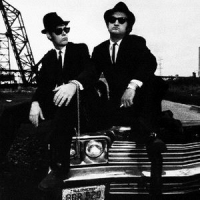
The Blues Brothers are a Grammy Award-nominated American blues and soul revivalist band founded in 1978 by comedians Dan Aykroyd and John Belushi as part of a musical sketch on Saturday Night Live. Belushi and Aykroyd, respectively in character as lead vocalist "Joliet" Jake Blues and harpist/vocalist Elwood Blues, fronted the band, which was composed of well-known and respected musicians. The band made its debut as the musical guest on the April 22, 1978, episode of Saturday Night Live.
The band then began to take on a life beyond the confines of the television screen, releasing an album, Briefcase Full of Blues, in 1978, and then having a Hollywood film, The Blues Brothers, created around its characters in 1980.
After the death of Belushi in 1982, the Blues Brothers have continued to perform with a rotation of guest singers and other band members. The original band reformed in 1988 for a world tour and again in 1998 for a sequel to the film, Blues Brothers 2000. They make regular appearances at musical festivals worldwide.
The band then began to take on a life beyond the confines of the television screen, releasing an album, Briefcase Full of Blues, in 1978, and then having a Hollywood film, The Blues Brothers, created around its characters in 1980.
After the death of Belushi in 1982, the Blues Brothers have continued to perform with a rotation of guest singers and other band members. The original band reformed in 1988 for a world tour and again in 1998 for a sequel to the film, Blues Brothers 2000. They make regular appearances at musical festivals worldwide.
Pans Labyrinth
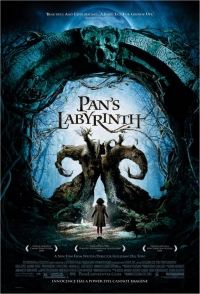
Pan's Labyrinth (Spanish: El laberinto del fauno, literally The Labyrinth of the Faun) is a 2006 Spanish language fantasy film written and directed by Mexican film-maker Guillermo del Toro. It was produced and distributed by the Mexican film company Esperanto Films.
Pan's Labyrinth takes place in Spain in May and June, 1944, after the Spanish Civil War, during the franquist repression. Also present is the main character Ofelia's fantasy world which centers around an overgrown abandoned labyrinth. Ofelia's stepfather, the Falangist Captain Vidal, viciously hunts the Spanish Maquis, guerrillas who fight against the Franco regime in the region, while Ofelia's pregnant mother grows increasingly ill. Ofelia meets several strange and magical creatures who become central to her story, leading her through the trials of the old labyrinth garden. The film employs make-up, puppetry, and CGI effects to create its creatures.
Del Toro stated that he considers the story to be a parable, influenced by fairy tales, and that it addresses and continues themes related to his earlier film The Devil's Backbone, a spiritual sequel, though not an actual sequel. The original Spanish title refers to the mythological fauns of Greek mythology, while the English title refers specifically to the faun-like Greek character Pan (intended to help English-speakers differentiate the title from the term fawn). However, del Toro has stated that the faun in the film is not Pan.
Pan's Labyrinth takes place in Spain in May and June, 1944, after the Spanish Civil War, during the franquist repression. Also present is the main character Ofelia's fantasy world which centers around an overgrown abandoned labyrinth. Ofelia's stepfather, the Falangist Captain Vidal, viciously hunts the Spanish Maquis, guerrillas who fight against the Franco regime in the region, while Ofelia's pregnant mother grows increasingly ill. Ofelia meets several strange and magical creatures who become central to her story, leading her through the trials of the old labyrinth garden. The film employs make-up, puppetry, and CGI effects to create its creatures.
Del Toro stated that he considers the story to be a parable, influenced by fairy tales, and that it addresses and continues themes related to his earlier film The Devil's Backbone, a spiritual sequel, though not an actual sequel. The original Spanish title refers to the mythological fauns of Greek mythology, while the English title refers specifically to the faun-like Greek character Pan (intended to help English-speakers differentiate the title from the term fawn). However, del Toro has stated that the faun in the film is not Pan.
The Hours
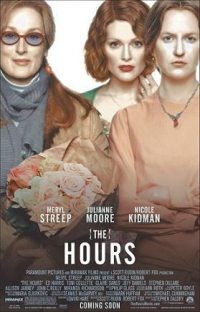
The Hours is a 2002 film about three women of different generations and times whose lives are interconnected by Virginia Woolf's novel, Mrs Dalloway. The film is starring Nicole Kidman, Julianne Moore, Meryl Streep and Ed Harris.
Bugsy Malone
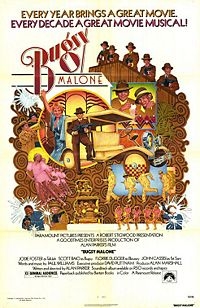
Bugsy Malone is a 1976 musical film, very loosely based on events in Chicago, Illinois in the Prohibition era, specifically, the exploits of gangsters like Al Capone as dramatized in cinema. The tongue-in-cheek movie stars children as the gangsters and their molls, toning down the subject matter sufficiently to receive a "G" rating. The plot concerns the manufacture of a brand of custard, which is used first in cream-topped pies (being hit with one in the face "kills" the character) then later in "splurge guns" that enable the dessert to be deployed on an unprecedented level. The musical centers on Fat Sam's Grand Slam speakeasy.
Written and directed by Alan Parker produced by Alan Marshall with executive producer David Puttnam, the film stars Scott Baio as the title character, with Jodie Foster in the role of Fat Sam's moll Tallulah. The music and lyrics are by singer-songwriter Paul Williams. All the songs on the soundtrack were actually performed by adults, including Williams himself, in his unmistakable high-pitched voice, and lip-synched by the cast. To commemorate its 30th anniversary, the film was re-released in limited cinemas in the UK on December 8, 2006.
Written and directed by Alan Parker produced by Alan Marshall with executive producer David Puttnam, the film stars Scott Baio as the title character, with Jodie Foster in the role of Fat Sam's moll Tallulah. The music and lyrics are by singer-songwriter Paul Williams. All the songs on the soundtrack were actually performed by adults, including Williams himself, in his unmistakable high-pitched voice, and lip-synched by the cast. To commemorate its 30th anniversary, the film was re-released in limited cinemas in the UK on December 8, 2006.
The Phantom of the Opera
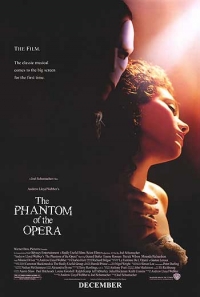
The Phantom of the Opera is a 2004 film adaptation of Andrew Lloyd Webber and Charles Hart's 1986 stage musical, which is based on the novel of the same name by Gaston Leroux. The film was written and directed by Joel Schumacher and Webber and Webber produced the film. The cast includes Gerard Butler as the Phantom, Emmy Rossum (who was only 17 at the time of filming) as Christine Daaé, Patrick Wilson as Raoul, Vicomte de Chagny, Miranda Richardson as Madame Giry, Jennifer Ellison as Meg Giry, and Minnie Driver (whose vocals were dubbed by Margaret Preece, a professional opera singer) as Carlotta Giudicelli. Ramin Karimloo (who had been playing Raoul in the London production of Phantom at the time of filming) appeared in a cameo role as Christine's father.
The film was a USA/UK co-production that had various distributors worldwide. For example, Warner Bros. (a main production partner) distributed the film in the USA, and Universal Pictures (producers and/or distributors of the 1925, 1943, and 1962 adaptations of the book) released the film in Latin America and Australia.
The film was a USA/UK co-production that had various distributors worldwide. For example, Warner Bros. (a main production partner) distributed the film in the USA, and Universal Pictures (producers and/or distributors of the 1925, 1943, and 1962 adaptations of the book) released the film in Latin America and Australia.
Annie

Annie is a 1982 musical film based upon the popular 1977 stage musical of the same name, with music by Charles Strouse, lyrics by Martin Charnin, and the book by Thomas Meehan. It was released in 1982 by Columbia Pictures.
The film version was directed by John Huston, and starred Carol Burnett and Albert Finney. This was Huston's first and only film musical.
The film version was directed by John Huston, and starred Carol Burnett and Albert Finney. This was Huston's first and only film musical.
The Piano
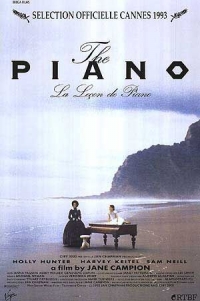
The Piano is a 1993 film about a mute pianist and her daughter, set during the mid-19th century in a rainy, muddy frontier New Zealand backwater. The film was written and directed by Jane Campion, and stars Holly Hunter, Harvey Keitel, Sam Neill and Anna Paquin. It features a score for the piano by Michael Nyman that became a bestselling soundtrack album. Hunter played her own piano pieces for the film, and also served as sign language teacher for Paquin, earning herself three different screen credits. The film was an international co-production by Australian producer Jan Chapman with the French company Ciby 2000.
Alistair Fox has argued that The Piano was significantly influenced by Jane Mander's The Story of a New Zealand River.
Alistair Fox has argued that The Piano was significantly influenced by Jane Mander's The Story of a New Zealand River.
Lost

Lost is an American serial drama television series that follows the lives of plane crash survivors on a mysterious tropical island, after a commercial passenger jet flying between Sydney, Australia and Los Angeles, United States crashes somewhere in the South Pacific. Each episode typically features a primary storyline on the island as well as a secondary storyline from another point in a character's life. The show was created by Damon Lindelof, J. J. Abrams and Jeffrey Lieber, and is filmed primarily on location in Oahu, Hawaii. The pilot episode was first broadcast on September 22, 2004. Since then, four seasons have been aired. The show is produced by ABC Studios, Bad Robot Productions and Grass Skirt Productions and airs on the ABC Network in the United States. Its soundtrack is composed by Michael Giacchino. The current executive producers are Abrams, Lindelof, Bryan Burk, Jack Bender and Carlton Cuse. Because of its large ensemble cast and the cost of filming in Hawaii, the series is one of the most expensive on television.
Critically acclaimed and a popular success, Lost garnered an average of 16 million viewers per episode on ABC during its first year. It has won numerous industry awards including the Emmy Award for Outstanding Drama Series in 2005, Best American Import at the British Academy Television Awards in 2005, the Golden Globe for Best Drama in 2006 and a Screen Actors Guild Award for Outstanding Ensemble in a Drama Series.
Reflecting its devoted fan base, the show has become a part of American popular culture with references to the story and its elements appearing in other television shows, commercials, comic books, webcomics, humor magazines, a video game and song lyrics. The show's fictional universe has also been explored through tie-in novels, board and video games, and alternative reality games, The Lost Experience and Find 815.
Critically acclaimed and a popular success, Lost garnered an average of 16 million viewers per episode on ABC during its first year. It has won numerous industry awards including the Emmy Award for Outstanding Drama Series in 2005, Best American Import at the British Academy Television Awards in 2005, the Golden Globe for Best Drama in 2006 and a Screen Actors Guild Award for Outstanding Ensemble in a Drama Series.
Reflecting its devoted fan base, the show has become a part of American popular culture with references to the story and its elements appearing in other television shows, commercials, comic books, webcomics, humor magazines, a video game and song lyrics. The show's fictional universe has also been explored through tie-in novels, board and video games, and alternative reality games, The Lost Experience and Find 815.
The Bodyguard
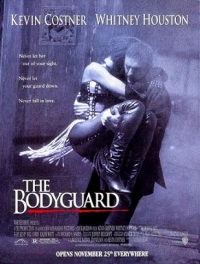
The Bodyguard is a 1992 romantic-suspense film directed by Mick Jackson, written by Lawrence Kasdan, and starring Kevin Costner and Whitney Houston.
The English Patient
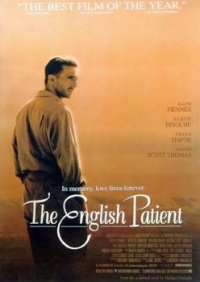
The English Patient is a 1996 film adaptation of the novel by the same name by Michael Ondaatje starring Ralph Fiennes, Kristin Scott Thomas, Willem Dafoe, Juliette Binoche (who won the Academy Award for Best Supporting Actress for her role as "Hana" in this film) and Colin Firth. The film, directed by Anthony Minghella, won nine Academy Awards, including Best Picture. Ondaatje worked closely with the filmmakers to preserve his artistic vision, and stated that he was happy with the film as an adaptation.
The Karate Kid
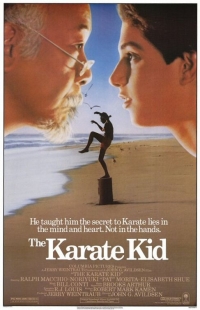
The Karate Kid is a 1984 film directed by John G. Avildsen, and starring Ralph Macchio, Pat Morita and Elisabeth Shue. It is a martial arts film and an "underdog" story much in the mold of a previous Avildsen success, the 1976 boxing film Rocky. It was a great commercial success upon first release, and has retained its popular following. It also received a favorable critical attention, earning Pat Morita an Academy Award nomination for Best Supporting Actor.
Top Gun

Top Gun is a 1986 American film directed by Tony Scott and produced by Don Simpson and Jerry Bruckheimer in association with Paramount Pictures. The screenplay was written by Jim Cash and Jack Epps Jr., and was inspired by an article written by Ehud Yonay for California Magazine entitled "Top Guns." The film stars Tom Cruise, Kelly McGillis, Anthony Edwards, Val Kilmer and Tom Skerritt.
The film follows LT Pete "Maverick" Mitchell, a young Naval aviator who aspires to be a top fighter pilot in the United States Navy Fighter Weapons School, which trains the top 1% of all Naval aviators. Maverick gets his chance to attend the school after one pilot drops out, allowing him and his RIO (Radar Intercept Officer, the "back seater" in the two-man F-14) LTJG Nick "Goose" Bradshaw to train with the best. The film opened in America on May 16, 1986 to good reviews, the aerial scenes being most notably praised. Similar praise followed soon afterwards when the film broke records at the box office, becoming a mega hit. The film accumulated over $350 million world-wide, and broke home-video sales records.
The film follows LT Pete "Maverick" Mitchell, a young Naval aviator who aspires to be a top fighter pilot in the United States Navy Fighter Weapons School, which trains the top 1% of all Naval aviators. Maverick gets his chance to attend the school after one pilot drops out, allowing him and his RIO (Radar Intercept Officer, the "back seater" in the two-man F-14) LTJG Nick "Goose" Bradshaw to train with the best. The film opened in America on May 16, 1986 to good reviews, the aerial scenes being most notably praised. Similar praise followed soon afterwards when the film broke records at the box office, becoming a mega hit. The film accumulated over $350 million world-wide, and broke home-video sales records.
The Bourne Identity
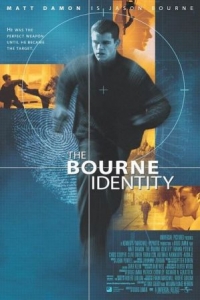
The Bourne Identity is a 2002 spy film loosely based on Robert Ludlum's novel of the same name. It stars Matt Damon as Jason Bourne, an amnesiac attempting to discover his true identity amidst a clandestine conspiracy within the Central Intelligence Agency (CIA) to track him down and arrest or kill him for inexplicably failing to carry out an officially unsanctioned assassination and then failing to report back in afterwards. Along the way he teams up with Marie, played by Franka Potente, who assists him on the initial part of his journey to learn about his past and regain his memories. The film also stars Chris Cooper as Alexander Conklin, Clive Owen as The Professor, Brian Cox as Ward Abbott, and Julia Stiles as Nicky Parsons.
The film was directed by Doug Liman and adapted for the screen by Tony Gilroy and William Blake Herron from the novel of the same name written by Robert Ludlum, who also produced the film alongside Frank Marshall. Universal Studios released the film to theaters in the United States on June 14, 2002 and it received a positive critical and public reaction. The film was followed by a 2004 sequel, The Bourne Supremacy, and a third part released in 2007 entitled The Bourne Ultimatum.
The film was directed by Doug Liman and adapted for the screen by Tony Gilroy and William Blake Herron from the novel of the same name written by Robert Ludlum, who also produced the film alongside Frank Marshall. Universal Studios released the film to theaters in the United States on June 14, 2002 and it received a positive critical and public reaction. The film was followed by a 2004 sequel, The Bourne Supremacy, and a third part released in 2007 entitled The Bourne Ultimatum.
The Chronicles of Narnia: The Lion, the Witch and the Wardrobe
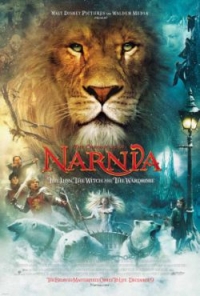
The Chronicles of Narnia: The Lion, the Witch and the Wardrobe is a 2005 fantasy film directed by Andrew Adamson based on The Lion, the Witch and the Wardrobe, the first published novel in C. S. Lewis's children's fantasy series The Chronicles of Narnia. It was produced by Walden Media and distributed by Walt Disney Pictures. Four British children are evacuated during the Blitz to the countryside, and find a wardrobe that leads to the fantasy world of Narnia, where they ally with the Lion Aslan against the forces of the White Witch.
It was released on December 9, 2005 in both Europe and North America to positive reviews and was highly successful at the box office. It won the 2005 Academy Award for Best Make Up and various other awards, and is the first of what will be a series of films based on the books. An Extended Edition was released on December 12, 2006 and was only made available on DVD until January 31, 2007. It was the best selling DVD in North America in 2006.
It was released on December 9, 2005 in both Europe and North America to positive reviews and was highly successful at the box office. It won the 2005 Academy Award for Best Make Up and various other awards, and is the first of what will be a series of films based on the books. An Extended Edition was released on December 12, 2006 and was only made available on DVD until January 31, 2007. It was the best selling DVD in North America in 2006.
 Daily Sheet Music is a web site for those who wants to access popular sheet music easily,
letting them download the sheet music for free for trial purposes.
It's completely free to download and try the listed sheet music, but you have to delete the files after 24 hours of trial period.
Don't forget, if you like the piece of music you have just learned playing,
treat the artist with respect, and go buy the original sheet music.
Daily Sheet Music is a web site for those who wants to access popular sheet music easily,
letting them download the sheet music for free for trial purposes.
It's completely free to download and try the listed sheet music, but you have to delete the files after 24 hours of trial period.
Don't forget, if you like the piece of music you have just learned playing,
treat the artist with respect, and go buy the original sheet music.